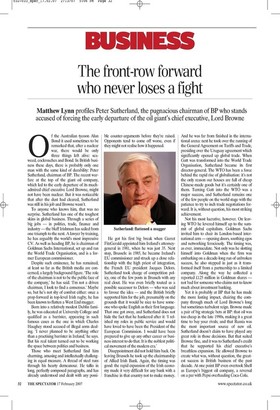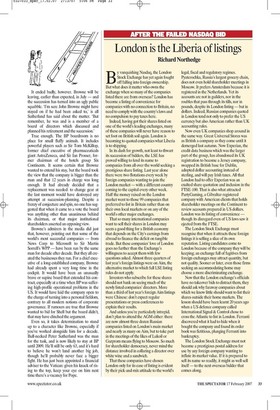The front-row forward who never loses a fight
Matthew Lynn profiles Peter Sutherland, the pugnacious chairman of BP who stands accused of forcing the early departure of the oil giant's chief executive, Lord Browne f the Australian tycoon Alan Bond it used sometimes to be remarked that, after a nuclear war, there would be only three things left alive: seaweed, cockroaches and Bond. In British business these days, there is probably only one man with the same kind of durability: Peter Sutherland, chairman of BP. The recent warfare at the top of the giant oil company, which led to the early departure of its muchadmired chief executive Lord Browne, might not have been nuclear. But it was noticeable that after the dust had cleared, Sutherland was still in his job and Browne wasn't.
To anyone who knows him, that was no surprise. Sutherland has one of the toughest skins in global business. Through a series of big jobs — in politics, trade, finance and industry — the bluff Irishman has sailed from one triumph to the next. A lawyer by training, he has arguably the world's most impressive CV. As well as heading BP, he is chairman of Goldman Sachs International, set up and ran the World Trade Organisation, and is a former European commissioner.
Despite such eminence, he has remained, at least so far as the British media are concerned, a largely background figure. 'The role of the chairman is not to be the public face of the company,' he has said. `I'm not a driven chairman, I look to find a consensus.' Maybe so, but he's not shy of combat either: once a prop-forward in top-level Irish rugby, he has been known to flatten a West End mugger.
Born into a relatively modest Dublin family, he was educated at University College and qualified as a barrister, appearing in such famous cases as the one in which Charles Haughey stood accused of illegal arms dealing. 'I never planned to be anything other than a practising barrister in Ireland,' he says. But his real talent turned out to be working the space between politics and business.
Those who meet Sutherland find him charming, amusing and intellectually challenging in equal measure. A thread of steel runs through his hearty demeanour. He talks in long, perfectly composed paragraphs, and has already understood and dealt with any possible counter-arguments before they're raised. Opponents tend to come off worse, even if they might not realise how it happened.
He got his first big break when Garret FitzGerald appointed him Ireland's attorneygeneral in 1981, when he was just 35. Next stop, Brussels: in 1985, he became Ireland's EU commissioner and struck up a close relationship with the high priest of integration, the French EU president Jacques Delors. Sutherland took charge of competition policy, one of the few posts in Brussels with any real clout. He was even briefly touted as a possible successor to Delors — who was said to favour the idea — and the British briefly supported him for the job, presumably on the grounds that it would be nice to have someone who spoke English as their first language. That one got away, and Sutherland does not hide the fact that he hankered after it: 'I relished my roles in public service and would have loved to have been the President of the European Commission. I would have been prepared to give up any other career or business interest to do that. It is the noblest political movement of the modern era.'
Disappointment did not hold him back. On leaving Brussels he took up the chairmanship of Allied Irish Bank. Again, the timing was good: the rapid expansion of the Irish economy made it very difficult for any bank with a franchise in that country not to make money.
And he was far from finished in the international arena: next he took over the running of the General Agreement on Tariffs and Trade, presiding over the Uruguay agreement which significantly opened up global trade. When Gatt was transformed into the World Trade Organisation, Sutherland became its first director-general. The WTO has been a force behind the rapid rise of globalisation: it's not the only reason our houses are full of cheap Chinese-made goods but it's certainly one of them. Turning Gatt into the WTO was a major success, and Sutherland remains one of the few people on the world stage with the patience to try to inch trade negotiations forward. It is, without question, his most striking achievement.
Not his most lucrative, however. On leaving WTO he levered himself up to the summit of global capitalism. Goldman Sachs invited him to chair its London-based international arm — opening doors, soothing egos and networking ferociously. The timing was, as ever, immaculate. Not only was he slotting himself into Goldman when the firm was embarking on a decade-long run of unbroken success, he also stepped in just as it transformed itself from a partnership to a limited company. Along the way he collected a reported £125 million in Goldman shares — not bad for someone who claims not to know much about investment banking.
Yet it is probably at BP that he has made the more lasting impact, chairing the company through much of Lord Browne's long but sometimes turbulent reign. Browne made a pair of big strategic bets at BP: that oil was too cheap in the late 1990s, making it a great time to buy your rivals; and that Russia was the most important source of new oil. Sutherland doesn't claim to have played any great role in those decisions. But that suited Browne fine, and it was to Sutherland's credit that he supported his chief executive's breathless expansion. He allowed Browne to create what was, without question, the greatest success in British business of the past decade. At one point BP even overtook Shell as Europe's biggest oil company, a reversal on a par with Pepsi overhauling Coca-Cola.
It ended badly, however. Browne will be leaving, earlier than expected, in July — and the succession has turned into an ugly public squabble. `I'm sure John Browne might have stayed on if he had been asked to,' is all Sutherland has said about the matter. 'But remember, he was and is a member of a board of directors which discussed and planned his retirement and the succession.'
True enough. The BP boardroom is no place for small fluffy animals. It includes powerful players such as Sir Tom McKillop, former chief executive of pharmaceuticals giant AstraZeneca, and Sir Ian Prosser, former chairman of the hotels group Six Continents. It seems certain that Browne wanted to extend his stay, but the board took the view that the company is bigger than the man and that 12 years in charge was long enough. It had already decided that a replacement was needed: to change gear at the last moment would have destroyed any attempt at succession-planning. Despite a frenzy of conjecture and spin, no one has suggested that when it came to a vote the board was anything other than unanimous behind its chairman, or that major institutional shareholders asserted an opposing view.
Browne's admirers in the media did just that, however, pointing out that some of the world's most successful companies — from News Corp to Microsoft to Sir Martin Son-ell's WPP — have been run by the same man for decade after decade. But they all created the businesses they run. For a chief executive of a long-established company, Browne had already spent a very long time in the cockpit. It would have been an unusually brave or supine board that extended his contract, especially at a time when BP was suffering high-profile operational problems in the US. It would have laid the company open to the charge of turning into a personal fiefdom, contrary to all modern notions of corporate governance. If rumours are true that Browne wanted to bid for Shell but the board didn't, that may have clinched the argument.
Even so, it takes determination to stand up to a character like Browne, especially if you've worked alongside him for a decade. Bull-necked Peter Sutherland was the man for the task, and is now likely to stay at BP until 2009. He'll still be only 63, and it's hard to believe he won't land another big job, though he'll probably never face a bigger fight. He has just been appointed a financial adviser to the Vatican: given his knack of rising to the top, keep your eye on him next time there's a vacancy for Pope.


























































 Previous page
Previous page